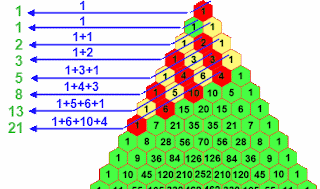Neruda and the Fibonacci numbers. Twenty Love Poems
In mathematics, the Fibonacci sequence is the next
infinite sequence of natural numbers:
0,1,1,2,3,5,8,13,21,34,55
The sequence begins with the numbers 0 and 1,2 and
from these, "each term is the sum of the previous two; and the elements of
this sequence are called Fibonacci numbers. This succession was described in
Europe by Leonardo of Pisa, Fibonacci, Italian mathematician of the thirteenth
century.
It has numerous applications in computer science,
mathematics and game theory. It appears in biological configurations, such as
the branches of the trees, the arrangement of the leaves on the stem, in the
flowers of artichokes and sunflowers, in the configuration of the pineapples of
the conifers; in the spiral structure of the shell of some mollusks, like the
nautilus. It is a series of magic numbers.
Pablo Neruda, pseudonym of Neftali Ricardo Reyes (July
1904, September 1973) was a Chilean poet and winner of the Nobel Prize for
Literature in 1971. One of his works, "Twenty Love Poems and a Song of Despair"
published in 1924 , has 21 poems. A Fibonacci number. Did Neruda know that, or
is it that mathematics and its magic numbers also have mysterious ways of
infiltrating creative activity? I do not know, it does not matter. Mathematics
is beautiful, and mysterious, poetry is beautiful and just one button is
enough. I present to you the Poem 20.
Poem 20
I can write the saddest verses tonight.
Write, for example: "The night is starry,
and they shiver, blue, the stars, in the distance
".
The night wind spins in the sky and sings.
I can write the saddest verses tonight.
I loved her, and sometimes she loved me too.
On nights like this I held her in my arms.
I kissed her so many times under the infinite sky.
She loved me, sometimes I also loved her.
How not to have loved her great still eyes.
I can write the saddest verses tonight.
To think that I do not have her. Feeling I've lost
her.
Hear the inmense night, even more without her.
And the verse falls to the soul as to the grass the
dew.
Does it matter that my love could not keep it.
The night is full of stars and she is not with me.
That is all. In the distance someone sings. In the
distance.
My soul is not content with having lost it.
As if to bring it closer my gaze searches for it.
My heart looks for her, and she is not with me.
The same night whitening the same trees.
We, the ones then, are not the same.
I no longer love her, it's true, but how much I loved
her.
My voice searched the wind to touch her ear.
Of other. Will be from another. As before my kisses.
Her voice, her bright body. His infinite eyes.
I no longer love her, it's true, but maybe I love her.
Love is so short, and oblivion is so long.
Because on nights like this I held her in my arms,
My soul is not content with having lost it.
Although this is the last pain that she causes me,
and these are the last verses that I write to you.
IN SPANISH:
IN SPANISH:
References
Sucesión de
Fibonacci
Pablo Neruda



No hay comentarios:
Publicar un comentario
Nota: solo los miembros de este blog pueden publicar comentarios.